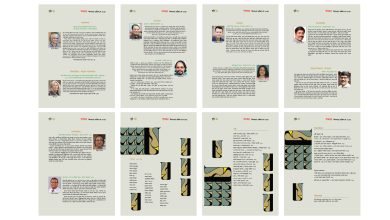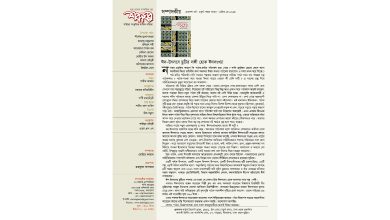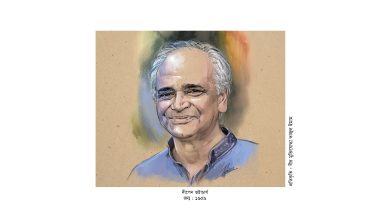The Moonlight Poster : Rizia Rahman
Story
Translated from the Bengali into English by Mohammad Shafiqul Islam
Jarul, palash, and krishnachurha are looking exceedingly ecstatic as if Ramna’s vast greens have suddenly enkindled.
On the deserted streets at hushed noon, the spring wind is swirling, dancing in spree. As the rickshaw has gone past the shining sunlight, Ranu silently christens it Boshonter Roth—the Spring Chariot. Is this called youth, happiness, or joy? Out of a few books on her arms, as soon as Ranu picks one, Ajit Datta’s Kushumer Mash, The Month of Kushum, a minuscule note comes out from a folded page—See you tomorrow. Grabbing the note with a great care, she takes in the spring smell and surreptitiously emits “see you tomorrow” and smiles—in droplets happiness falls all around.
Putting such a wonderful note in the hand, moving forward by rickshaw on a sunny spring day appeared thrilling—if only Mahfuz were here.
Although Mahfuz is very excited, thrilled, and restless today, he is enjoying the excitement like jarul, palash, and krishnachura. Handing over Kushumer Mash to Ranu, he said, “I don’t have enough time, as I’ll join the procession. Don’t be late, go home—only a few rickshaws are moving this side, but everything is closed all over.”
Mahfuz didn’t even help Ranu find a rickshaw. Carrying a sack of posters, he disappeared quickly, riding a bicycle.
Ranu’s friends are giving a curved smile at her. Landing a pinch, Anima asks, “Who’s he? Why has he fled away this way? Is he afraid of us?”
With red radiances in both cheeks, Ranu turns her face away, affirming, “He’ll join the procession, I know.” ‘Procession’ creates a sort of stir among her friends, and Anima looks more excited as she adds, “Let’s join the procession—all of us, please.”
As no class was held in college, everyone came to Anima’s house—her house is adjacent to the college area. From there, they conveyed the information to Medical College Hostel that Anima is looking for Ajit Datta’s Kushumer Mash. Giving the information, everyone was waiting in front of the gate, and in no more than five minutes, Mahfuz came over. Instantly Ranu rode on the rickshaw, telling her friends, “I can’t join the procession without father’s permission.” From the rickshaw, she could hear them laughing.
In this season of spring, Dhaka is now the city of slogans and rallies—the book of poetry Kushumer Mash in Ranu’s hand. In February 1952, she reached eighteen. The noon with a boundless feeling of joy reminds her of her birthday tomorrow. She keeps her eyes again on Mahfuz’s note—See you tomorrow.
Golden sunlight is cascading down on the long eucalyptus plants by the main gate in front of the house. Ranu stops for a while. Turning her neck, as soon as she looks up, her long plaits fell down upon her back. Watching the wild excitement of the eucalyptus branches amidst spring wind, she laughs out. The wind grabs and dispenses her laugh over the vast Purana Paltan field. And before leaving, the wind emits—See you tomorrow.
In a thrilling frame of her mind, Ranu is quiet. Strange! Can she get the language of wind too? This is just like that. The language of rain and flowers becomes meaningful to her—everything speaks to Ranu. She listens to whatever her companions around speak. Indeed her mother used to tell her all these things. When she was a child, her mother took her in the lap and walked on the verandah at moonlit night. She called out the moon, “Come over, O dear moon, press a fingertip/ On the moon’s forehead, put a fingertip.” Through rhymes and songs, she used to call sailing boats and trained champa and parul flowers to talk. Indeed Ranu learnt all this language from her mother. Giving a thought over this for quite long, she finally told Mahfuz, “Mahfuz Bhai, can you get the language of rain?” At first, Mahfuz was astounded and then gave a laugh, “Read less poetry—understand?” Ranu was hurt. Why should Mahfuz talk like this! He isn’t like others. Mahfuz quietly said, “A stupid girl, listen, flower-studded isn’t the way of the world.”
Poetic words, none but only Mahfuz can express! Ranu is excited, “What’s the next line, Mahfuz Bhai?”
“Next line? Better you write that.”
Clinks, clinks ring the bicycle bell and she seems to wake up, as if blood flowed from heart to face. Mahfuz? No, he hasn’t come. Senior brother Babu Bhai has come from Engineering College Hostel. He notices Ranu is looking indifferent, acutely quiet, as if absorbed in some deep thoughts. Pushing the bicycle while going inside, he softly asks, “What are you doing outside at this scorching noon? Get in.”
It appears as if an elder brother offers some love and affection to a half-crazy sister. Ranu smiles and gets into the garden. Stepping on the stairs, she looks around. In Babu, Anu and Ranu’s father Majed sahib’s favourite flower garden has amassed grasses and weeds. It’s indeed good because Majed sahib can remain busy with them. What else can he do? Babu and Anu, his two sons, live in hostels. Only Ranu and her father are at home. Among others, the cook Abu’s mother and the caretaker Mosharrof, who also accompanies Majed sahib. Ranu’s Mosharrof uncle—if he takes leave, Majed sahib becomes extremely alone. He then remains tied-up, taking care of the garden and weeding out. Or else he has to spend time reading newspapers or books.
Getting up on the verandah, Ranu pries into her father’s room—he’s reading a book, lying on the easy chair, his elder brother standing close by. As soon as she puts her steps on the stairs of the second floor, she can hear her father saying, “You want to join the rally! But the government has imposed Section 144.”
“We don’t stand by 144. Why should we act upon this injustice? You tell us why not Bengali is the state language?”
Ranu doesn’t wait anymore.
While mounting up through stairs, she copies Mahfuz, “We want Bengali as the state language.” Then with rays of smile on her face, she gets on the second floor, to her own room, and flings books and notebooks on the table. Ah, what a feeling of peace! This room is her own world, the world of peace and pleasure—a single cot with a blue bedcover, a reading table with a lamp just close by, mother’s photograph hung on the white wall, and a picture of a bunch of tuberoses. That’s what Anima, Ranu’s friend, gifted her. Putting the sandals near the dress-stand, Ranu collapses down on the bed. It’s delight and thrill, as if joy is overflowing in her room.
Lying on the bed, Ranu looks out the window, just beside the bed. Thin leaves of coconut trees rustle while in touch with window-rods, almost the whole day, and talk to Ranu. Her mother planted the trees—indeed tree after tree—around the house immediately after buying it. Now she turns her look to her mother’s photograph—the round beautiful face of her mother, with earrings on, as if straining her eyes toward Ranu, watching her deeply, always trying to protect her too. Now Ranu rises up, looks at her mother’s photo. Her mother’s eyes are lively
“Today I’ve returned early. You’re wondering why, right?”
“Oh, you!”
“As two classes have been cancelled, the other class will be held in the afternoon, so I’ve come.”
In her mother’s eyes flashes a fake rage, “Are you hiding anything?”
Straightaway Ranu chuckles out, “O Ma, what you are! You can make out everything. Why not? Indeed after death, people can know everything, so you know well why I went in front of the college. I went to meet Mahfuz. Have you got angry, Ma? Please, don’t. He’s a very good boy, son of your friend.”
Now rage in her mother’s eyes has turned into affection.
“Ah, thanks Lord! I knew you wouldn’t frown upon me.”
Now Ranu gets into the mood of a conversation, “Do you know, Ma, Bhaiya will join rallies? Mahfuz too. They want Bengali as the state language. I want too. Don’t you want, Ma? Baba says, ‘Who can snatch away the mother tongue?’ Well, Ma, have you ever heard of section 144?”
Mother’s face dazzles in a ray of smile, “Stop prattling, Ranu.” Ranu also laughs, “Okay, Ma.”
Ranu goes to bed again. Like the beautiful poetry lines, Mahfuz’s small note of love sways her heart. As if the great feeling of “Come over, O dear moon, press a fingertip” spreads all over the room. Ranu feels like sleeping. She puts her folded chubby beautiful arms on the eyes.
“You fall asleep in these odd hours, I see! Get up, wash hands and face. Food is served on the dining table downstairs—don’t sleep without eating.”
Ranu lifts hands from her eyes.
“Don’t disturb me, Ma, I won’t eat now; actually, I don’t feel like eating anything this moment.”
“Enough! Now get up. Like an ideal girl, wash your hands and go to the dining table.”
“No, I’ll neither get up now nor eat; rather, I’ll keep lying, will see the sky through the window, watch kites flying, and listen to coconut leaves talk.”
“Ranu, you’ve become so unruly!” Ranu gets a bit astounded, the eyes stuck on her mother’s photo. She can clearly hear how her mother tries to bring her round. Absorbed in listening to the sound of her mother’s voice, she attempts to see something covered with a screen. While nine years old, Ranu was weeping, losing a fight against Babu. In rage, she then threw away her elder brother’s geometry box over the wall. Her mother came over and took her to task, “Why have you hurled the box away? You’ve become so unruly!”
Ranu turns her face away from the blurred sight of memories. Her mind turns blank, emptiness prevailing everywhere. All alone and sad, she begins to sob, a pillow on her face, “Ma, why did you die leaving this nine-year Ranu in the vast world?”
It’s as though the nine-year old Ranu, who lost her mother long ago, now weeps and then sinks into sleep.
“Ranu, O Ranu, why are you sleeping without eating anything? Get up, Ma.”
Ranu opens her eyes. Dense fog reigns as though it’s making a wave of foam everywhere. Where’s Ranu? Is she now in the river? Because of heavy fog, the steamer is stuck in the winter morning. Father says, while arranging the bed, “Can’t you lift the window shutter? It’s heavy fog, nothing can we see. The wind from the river is also extremely cold; it may cause pneumonia.”
Turning her face from the cabin window, Ma gives a smile that Ranu madly loves to see—the smile, as if it’s a rose. No, it’s not a rose, it’s a tuberose—the tuberose soaked in the rain. Indeed at nine, Ranu came to know it’s her mother’s smile.
Babu is tying shoelaces, already wearing a full-sleeved jumper, a woolen hat, and long warm socks until knees—looking wonderful. With dresses and shoes on, Anu is also looking like a gentleman. As if like kitties, they were sitting beside their mother.
Crouched inside a woolen blanket so long, Ranu comes out and asks, “Where are we now, Baba?”
“In the river, the Padma. Just after this ghat is our station.”
Mother’s brown Kashmiri shawl, Father’s woolen coat and muffler, the bed tied with khaki holdall, a big suitcase, a tiffin carrier, water bottles, and tea flasks—in everything of these there’s a touch of Ranu’s mother’s smile. Everyone became part of the party arranged in winter every year on the eve of yearly visit to grandmother’s house.
“Ranu, O Ranu, haven’t you gotten up yet?”
Floating amidst the foam of fog, Majid sahib’s voice reaches out to Ranu, so she seems to wake up. She pulls the pillow to cover her face, turns aside, and softly touches her own hair. Then when she lifts the pillow from her face, the table lamp instantaneously lights up the whole room. In this clear light, Ranu can see her old father—wearing a khaddar shawl—standing before her. With his anxious eyes, he watches Ranu, his finger still on the table lamp switch.
“What’s happened, Ma? Are you alright?” Majid sahib sounds worried. Ranu doesn’t respond, only keeps her eyes on him—what an affectionate gesture mixed with worry!
“Just coming back from college, you fall asleep!”
Ranu closes her eyes. Now not the girl just blossomed as the first flower of spring, she goes back to her childhood, exactly nine years of her age. With her eyes closed, she can feel her father’s affection and love, see mother’s smile and fog dispensing here and there; the state of her childhood days comes back. With her sleep-stricken eyes, Ranu asks, “Where are we now, Baba? In the river?”
Khadi shawl clad, a retired lonely old man, Majed sahib sits beside Ranu and gives a smile, “You were dreaming, right? Get up, go to restroom to wash hands and face. You haven’t eaten rice. I told Abu’s mother to make daal puri—crispy flatbread—for you. Ranu gets up and sits on the bed. Amidst the table lamp light, she notices her father watching her mother’s photo—his eyes making a thin silvery line of tears. Is this called love or affection or parting?
All of a sudden Ranu turns indifferent. Just then unsettling wind begins to blow. Through chinks of thin coconut leaves, the moon as if a golden plate peeps out and dazzles.
“Baba, shall I put out the lamp?”
Extending her hand to the lamp, Ranu looks at the window, “Baba, can you see the moon? Today is probably the full moon.”
Majed sahib quietly smiles. Very capricious and contemplative is her daughter—he softly holds her. As soon as she puts out the lamp, the whole room gets distinctively bright. Flower fragrance from outside adds to the aura in the room. Kathalchampa? Kamini? No, no, tuberose—it must be the tuberose, Ranu confirms. As Mosharrof uncle has gone home, her father works in the garden twice a day, so flowers must blossom now. She turns to her father and notices the moonlight is cascading over the folds of khadi shawl. “Baba,” she calls him in a very faint voice.
“Hmm,” he responds.
“Do you get the flower smell?”
“Yes, I do.”
“Which flower, Baba? Tuberose?”
“Maybe.”
Keeping quiet for a while, she asks again, “Baba, human soul is immortal, am I right?”
Managing a momentary shock, he softly emits, “Hmm, that’s what we’ve known for long.”
“Does soul have fragrance? Are we now having the smell of my mother’s soul if it’s now close to us?”
A wave of restlessness surges through Majed sahib’s appearance.
“Drop these things, Ranu.”
Ranu notices the moon seems to tremble in her father’s silence. Still she’s feeling excited to talk about her mother, so she asks again, “Was the tuberose Ma’s favourite flower?”
“Perhaps it was.”
Ranu feels a bit piqued, “Strange, you don’t know, you say! You certainly know but don’t want to tell me.”
Majed sahib gives a broken smile, “It seems you’ve become more restless. Don’t you write poetry nowadays?” Instantly the formless structure of poetry starts floating like incense around her.
In a fragrance of formless wind,
strange conversation,
quiet is the cheerful moon the whole night…
“Have you then stopped writing poetry?” asks Majed sahib again.
Ranu gets up from the bed, and handling her sari anchal, she smiles, “No, I don’t write but read. Jibanananda Das’s poems are so beautiful! Will you listen, Baba?” With all excitement, she begins to recite:
Again I’ll come back
to this Bengal
by the bank of this Dhanshiri river.
She suddenly stops—another line intrudes into Das’s poem, See you tomorrow.
Instantly she feels impatient for Mahfuz—for him a severe pain in the heart! She wishes she could meet him even if only for five minutes and with his deep voice, he would recite Das’s poems …!
As I saw her in the dark,
she said…
“Ranu, come down. I’m leaving.”
Majed sahib rises up, stops near the door, takes a look at the photo of Ranu’s mother, and says softly, “I’m not feeling good today. Babu has joined the rally. God knows what happens! Let me see if Anu has come.” He walks down stairs.
Ranu couldn’t listen to what her father was saying. Absorbed in a deep thought of poetry, she walks up.
Getting into the washroom, Ranu splashes water over her face, changes sari in the room, and makes hair with an indifferent frame of mind. Then all of a sudden her look turns to the night sky flooded in moonlight, and her mind reverberates with the sonority of poetry:
The night is still young,
so am I awake.
Mother’s song,
the moon puts a fingertip—
no cruel hand
has snatched away.
The reading of the rhymed poem stops, so rhythm breaks. Anu’s screams from downstairs fill the whole house. Quickly putting on sandals, Ranu gets down to the room where Majed sahib and Anu are talking. Indeed Ranu can hear her father say, “Are you sure Mahfuz is shot . . . and what about Babu? He was also in the rally . . . .”
“I don’t know about Babu bhaiya, but information about Mahfuz is right—my friends took him to the hospital.”
Ranus stands still and quiet on the stairs. What’s going on? Why are the stairs shaking? Where’s this roar—as if in the ocean—happening? She returns to the room, trembling, turns the light on—the room is just the same like before. Then what’s happened and where? Why then has the moon outside the window turned motionless? Why have silvery clouds halted? Only the wind is carrying the roaring slogan We want Bengali as the state language. The slogan of Mahfuz’s poster is floating along too. With her two hands, Ranu grabs her mother’s photo, “Ma, why aren’t you speaking? I love him; he hasn’t committed any crime. He also loved me and the mother tongue . . . as I do.” Suddenly a flash of wind blows, shaking the moments of the night, causing the fall of a shaft of moonlight. Mother’s look is stock-still.
Just like sleeping on the mother’s lap, in search of full security and safety, like a child, Ranu rests her head on her mother’s photo and begins to weep, “Ma, O Ma, why don’t you speak? Why are you silent?”
Wind has stopped blowing, the moon is gloomy, and the lattice of coconut leaves has stopped stirring. Ranu is still restless, “Please, talk, talk to me, Ma. If your words stop, I won’t survive, won’t be able to write poetry anymore.” The photo is still silent. Quiet is the night. Ranu breaks down in tears, “Why have they snatched away my mother’s words? Why won’t my mother speak anymore? Why won’t she sing to me: Come over, O dear moon, press a fingertip . . .?”
At the broken sounds of cries, the moon trembles. Wind too. The sounds dispense in the sky. Now Ranu, as if a nine year old girl, sits up on the floor, breaking down in tears beside her mother’s dead body wrapped in burial cloth. A strong wind blows, as if a roar in the ocean during storm—We want Bengali as our state language/ You have to accept our demands.
Ranu slowly stands up, wiping tears, lifting her head up, and clenching her fist. In a fire of rage, wrath, and resistance, she hit the wall hard with her clenched fist, “Why? Why should they snatch away my mother tongue? I can’t accept, I won’t accept this, never . . .”
Like a lunatic, Ranu keeps hitting the wall. Blood splashes from her broken fingers, scattering over the white wall and her mother’s photo. Prints of fresh blood from Ranu’s hands here and there!
“Speak, Ma, speak.” The whole house trembles as Ranu wails.
“Oh, Ranu, what are you doing? The room is flooded in blood.”
Astounded, Ranu stops hitting the wall and then breaks down in tears, “Ma, are you speaking again? Ma, O Ma!”
Ranu’s agitated cries reach downstairs. Majed sahib and Anu get stunned, instantly storming into her room.
Ranu is weeping—her hands blood-soaked—holding her mother’s photo.
Majed sahib grabs Ranu, “Oh, what have you done, Ma? Hold off, hold off the photo . . .”
Ranu jerks her father’s hand away, “No, I won’t let anyone snatch away my mother tongue.”
Anu brings a bottle of Dettol from the restroom, “She’s got insane. Maybe, she isn’t taking the medicine properly.” From the drawer of the table, he opens out the tranquillizer and sleeping pills.
Ranu’s frail hands get off from her mother’s photo. Putting her head on her father’s shoulder, Ranu mutters in a feeble voice, “Ma will now walk at moonlight, taking me into her lap, and sing: Come over, O dear moon, press a fingertip. . .”
Majed sahib has Ranu lie on the bed, and wiping blood with dettol, Anu bandages her hand. And having her take a sleeping pill, Anu stands up, “Baba, I leave now. I need to visit them in the Medical College Hospital.”
Anu leaves. Sinking into slumber, Ranu watches her father sitting close to her head. Her father’s face and mother’s smile in the photo now dip and then float in the foam of the faded moon, as if the steamer stood still for dense fog in winter morning. In an exhausted and broken voice, Ranu asks, “Where are we, Baba? In the river?”
“Yes, Ma, we’re floating in a flowing river,” responds Majed sahib in a very cool and depressed voice. Instantly the steamer begins to move in the fresh and strong wave of the river. A fresh smile also gets back to her mother’s face. Ranu’s soft hands clutching her father’s fist so long drop off and turn cold. Agitated nerves calm down through a peaceful sleep. Bit by bit the moon spreads the vast sheet of light throughout the whole sky. Everywhere around Ranu who is now sleeping peacefully is written down with moonlight See you tomorrow.
Rizia Rahman : Fictionist in Bangla Literature
Mohammad Shafiqul Islam, poet, translator, and academic, is Professor of English at Shahjalal University of Science and Technology, Sylhet
Illustration : Satabdi Zahid




